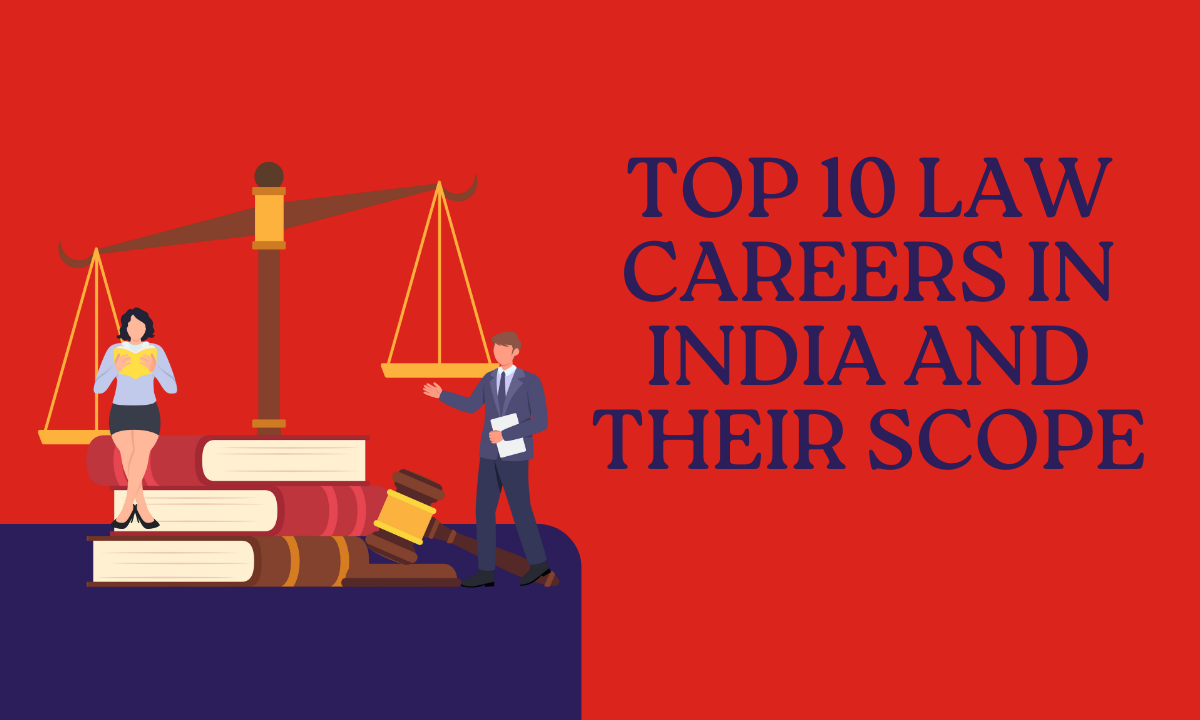+91 9990898327
Office : 632, Dr. Mukherjee Nagar, Delhi 110009
Mon-Sun: 09:00AM - 08:00PM

The transformation of the legal profession in the country has opened various avenues for law students in terms of law careers. With hard work and expertise, every career that a law graduate opts for can be highly rewarding. Following are the top 10 careers that one can opt for:
A law graduate specializing in business law can opt to work in law firms dealing with corporate matters, multinational companies, and startups. This is one of the most lucrative career options in the country since it pays well. Additionally, with the rapid growth in the business sector, demand has risen, and companies have been hiring more lawyers to advise on business matters such as mergers, acquisitions, company formation, intellectual property, and labour laws.
By having a law degree, one can also opt for litigation, a traditional career that most students. When lawyers opt for practice in court, they get an opportunity to represent their clients before various courts in the country, including district courts, high courts, Supreme Court, and tribunals, in matters such as civil, criminal, and family law. Students can work with senior advocates or even establish their practice after a particular point in time.
Another option that one can avail of while pursuing law as a career is to opt for judicial services, which are considered one of India's most prestigious law careers. To become a judge, one must clear judicial exams such as the district or higher judicial services exams. The career is highly respected and provides job security, stability, and a good salary package.
Legal advisors advise various individuals and organizations, including government agencies and businesses, on all legal matters to help them easily navigate legal challenges and avoid litigation. To become a legal advisor, an individual needs to have a law degree and expertise in a specific area of law. They can work in various sectors like real estate, banking, finance, and media.
Public prosecutors represent the state in criminal cases and work on its behalf for the prosecution of offenders by presenting evidence, examining witnesses, and seeking justice for victims. To become a public prosecutor, it is important for one to have a law degree and experience as a practicing advocate, but the government appoints them, and the process also involves clearing competitive exams.
With the rise in technological inventions and consequent increment in cases related to infringement and selling counterfeit goods, the demand for lawyers specializing in intellectual property law has seen a boost. These lawyers deal with various issues related to trademarks, patents, copyrights, and trademarks owned by individuals and organizations. To become one, an individual must have a law degree and a specialization in intellectual property law.
The demand for cyber law experts has increased with the rise in digital transactions, online businesses, and cybercrimes. This is because cyber law experts are trained to deal specifically with cybercrime, data protection, privacy laws, and online defamation; it is thus important for them to have a law degree and a deep understanding of technology. The scope of this law career is wide since they can work in law firms, tech companies, and government agencies and offer consulting services or solutions.
Human rights lawyers work for the protection of fundamental rights and freedom of individuals, with a main focus on the ones belonging to marginalized and oppressed communities. The scope of being a human rights lawyer is wide as they get to work with international organizations, NGOs, government agencies, and human rights commissions.
After getting a law degree, a postgraduate degree, or a PhD degree, an individual can also opt to become a professor and teach in law colleges or universities conducting legal research. Besides teaching in educational institutions, one can also become a legal researcher and contribute to writing academic papers, textbooks, and articles in legal journals.
The demand for specialists dealing with alternative dispute resolution has increased due to businesses preferring faster and cost-effective methods for resolving disputes by avoiding litigation. Thus, against this backdrop, a law graduate with an additional certification in arbitration law can opt to become an alternative dispute resolution specialist and work either as an independent mediator or arbitrator or join law firms specializing in ADR centers.
Individuals with a law degree can also join government offices offering legal services, drafting legislation, representing the government in legal matters, and formulating public policy by clearing competitive exams. The scope of this is wide; individuals can work in the union law ministry, public sector companies, state and central government departments, and hold high-ranking positions as law officers.
Choosing the right career path in law is important since it defines an individual's future, and thus, one should opt for only the avenue where their interest lies. If one loves courtroom drama, then opting for litigation or public prosecutor is an ideal choice, but if one is interested in business law, one should either become a corporate lawyer or legal advisor. In cases where technology fascinates them, they should opt for becoming a cyber law expert, and if they prefer the resolution of disputes, they should opt for ADR. For those who do not wish to involve themselves with the nuances of court, becoming a legal professor or a researcher is a better idea.
In a company, a legal advisor offers advice on all legal matters to help them resolve legal challenges without approaching court.
With the rapid growth in the business sector, the demand for corporate lawyers has risen, and companies have been hiring more lawyers who can advise on business matters such as mergers, acquisitions, company formation, intellectual property, and labor laws.
The demand for cyber lawyers has risen in India with the reliance on technology, digital transactions, online businesses, and cybercrimes.
Post a comment